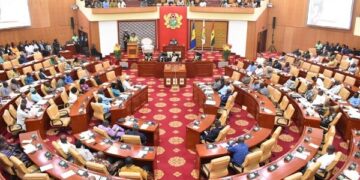Three institutions, have on behalf of 30 cocoa farmers, filed a petition with Ghana Cocoa Board (COCOBOD), which among others, is seeking a review of the appointment mechanism of the Chief Executive Officer of the Board.
The petition will test COCOBOD’s promise to give cocoa-growing communities a voice in the appointment of the CEO.
The petitioners also want to “test the robustness, application, and transparency of the Ghana COCOBOD’s Environmental and Social Management System In 2018, the Ghana Cocoa Board (COCOBOD) established an Environmental and Social Management System (ESMS) that includes a grievance and redress mechanism.”
The ESMS seeks to provide a structured framework for identifying and managing potential environmental, social, health and safety risks, impacts and opportunities of all operations in the cocoa sector.
The ESMS and the grievance and redress mechanism apply to COCOBOD, its subsidiaries and divisions, productivity-enhancing programmes, projects and activities, contractors, service providers, consultants and parties associated with any of the operations of the Board.
It also is to continually improve the system and sustainability of cocoa production.
The petitioners added: “This grievance highlights high-risk environmental and social violations that COCOBOD has failed to address,” and “we expect COCOBOD to respond to this claim and take rapid, robust action to address the issues.”
The farmers are mostly from the Sefwi Wiawso, a major cocoa producing area of the Western North Region, and the institutions that jointly presented the petition were Corporate Accountability Lab (CAL), the University of Ghana School of Law and Civic Response (Ghana).
The grievance underscores the environmental and social issues that COCOBOD is mandated to monitor and resolve, but which the petitioners said the ESMS had failed to do since its inception.
Addressing a presser in Accra after presenting the grievance, Mr Raymond Ennin, Programmes Officer of Civic Response, said the petitioners “want the power to appoint the CEO of COCOBOD to be taken from the President.”
The CEO, they said, should be appointed within the rank and file of actors in the industry and should be a qualified person in the cocoa sector.
He added that COCOBOD should improve the relationship it has with cocoa farmers and not see is as that between an employer and employer, but rather a partnership.
In 2018, COCOBOD established an Environmental and Social Management System (ESMS) that includes a grievance and redress mechanism for cocoa farmers, as a prerequisite for receiving a $600 million syndicated loan from the African Development Bank (AfDB).
The ESMS seeks to provide a structured framework for identifying and managing potential environmental, social, health and safety risks, impacts and opportunities of all operations in the cocoa sector.
Nana Yaw Reuben, Media Lead of the Ghana Cocoa Coalition said the farmers called for an increase of the farm gate price to ensure living incomes for farmers.
He re-echoed the farmers’ demand on companies to comply with their commitments to end deforestation in the sector and assist cocoa farmers transition to agroforestry.
The petitioners urged the ESMS speak on the behalf of Ghanaian cocoa farmers that children helping parents on cocoa farms did not constitute child labour and review the child labour laws so that they children can help close the widening generational gap between retiring cocoa farmers and the youth.
The petitioners look forward to more engagements with the COCOBOD on issues in the cocoa industry.
GNA




















































































